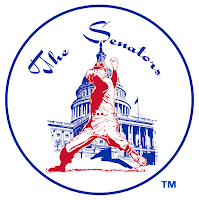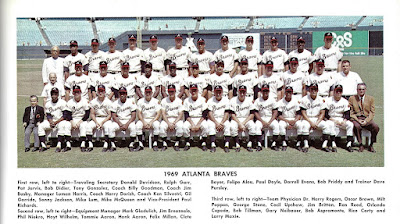Donald Edward Wilson
Houston Astros
Pitcher
Bats: Right Throws: Right Height: 6'2" Weight: 195
Born: February 12, 1945, Monroe, LA
Signed: Signed by the Houston Colt .45s as an amateur free agent before 1964 season
Major League Teams: Houston Astros 1966-1974
Died: January 5, 1975, Houston, TX (age 29)
Don Wilson made his big league debut with the Astros as the 1966 season wound down, and beginning in 1967 was one of the club's best pitchers for the next eight seasons. On June 18, 1967, Wilson pitched his first no-hitter against the Braves, striking out 15 overall, including Henry Aaron (#100) for the final out. Wilson won 16 games in 1969, including his second no-hitter on May 1st against the Reds. He'd strike out 235 that season, a career best. Wilson's career year came in 1971 when he was 16-10 with a 2.45 ERA in 34 games, throwing 18 complete games and three shutouts. He'd go to his only All-Star Game in 1971, pitching the final two scoreless innings in a 6-4 loss to the American League.
He'd continue to find success over the final three seasons of his career, winning 15 games in 1972 and eclipsing the 200-innings pitched mark every season between 1971 and 1974. Wilson was 104-92 in 266 games with a 3.15 ERA and 1,283 strikeouts. He tragically passed away in January 1975 of carbon monoxide poisoning in his home's garage. His young son also passed away in the incident, and the deaths were ruled accidental. The Astros retired Wilson's #40 in 1975 and he was one of the inaugural members inducted into the Houston Astros Hall of Fame in 2019.
Don Wilson made his big league debut with the Astros as the 1966 season wound down, and beginning in 1967 was one of the club's best pitchers for the next eight seasons. On June 18, 1967, Wilson pitched his first no-hitter against the Braves, striking out 15 overall, including Henry Aaron (#100) for the final out. Wilson won 16 games in 1969, including his second no-hitter on May 1st against the Reds. He'd strike out 235 that season, a career best. Wilson's career year came in 1971 when he was 16-10 with a 2.45 ERA in 34 games, throwing 18 complete games and three shutouts. He'd go to his only All-Star Game in 1971, pitching the final two scoreless innings in a 6-4 loss to the American League.
He'd continue to find success over the final three seasons of his career, winning 15 games in 1972 and eclipsing the 200-innings pitched mark every season between 1971 and 1974. Wilson was 104-92 in 266 games with a 3.15 ERA and 1,283 strikeouts. He tragically passed away in January 1975 of carbon monoxide poisoning in his home's garage. His young son also passed away in the incident, and the deaths were ruled accidental. The Astros retired Wilson's #40 in 1975 and he was one of the inaugural members inducted into the Houston Astros Hall of Fame in 2019.
Building the Set / Card #209
March 12, 2023 from The Philly Show (Uncle Dick's Cards)
In mid-March, Doug and I attended the Philadelphia Sports Collectors Show, held within the Greater Philadelphia Expo Center in Oaks, Pennsylvania. My main focus for this show was accumulating as many 1969 Topps commons as possible, which I did by adding a grand total of 193 cards to our set. That's almost 30% of the entire set added in one enjoyable afternoon. I wrote a full summary of the show in a post over at The Phillies Room, found here.
This is the 132nd of the 193 commons and semi-stars purchased, pulled and stacked from the first two neon green binders housing 1969 Topps cards at the multi-table spread of Uncle Dick's Cards from Babylon, New York. My method was simple - I pulled up a chair, found a card I needed, picked the best of the group from the binder page and set it aside. After each 100 cards, I'd ask the dealer to tell me how much damage I had done so far. With a budget in mind, I kept going twice, continuing after card #100 and card #200, and stopping at card #298. The final amount due was 17% off the sticker price for the pile of 193 cards, with this card costing me less than a dollar.
The Card / Astros Team Set / Accuracy Index +2
Topps still wasn't ready to use the Astros name or logo on its cards, so while Wilson is wearing the correct uniform and hat, the front of his hat is blacked out. Here's a great article from SABR's Baseball Cards Research Committee with an explanation as to why Wilson's Astros hat has been blacked out on this card. (In this case, read the comments.) In short, the Astros had demanded Topps not use its name or logo on any of its products. The 18 strikeout performance mentioned on the back of the card came on July 14, 1968 against the Reds.
Accuracy Index: Wilson gets +5 for the Astros uniform, but -3 for the blacked out hat.
1969 Season
Wilson was the opening day pitcher for the Astros, facing off against the Padres in the first game in that franchise's history. The highlight of Wilson's season was his no-hitter against the Reds on May 1st, which came the day after Reds' pitcher Jim Maloney (#362) had no-hit the Astros. He was 16-12 with a 4.00 ERA in 34 starts, with 13 complete games. Wilson's 235 strikeouts led the team, as he had three more than teammate Larry Dierker (#411). Dierker, a 20-game winner, led the Astros' pitching staff in just about every other major pitching category.
|
|
|
|
|
First Mainstream Card: 1968 Topps #77
Topps Flagship Set Appearances (8): 1968-1975
Most Recent Mainstream Card: 1981 TCMA The 1960s II #326
Total Non-Parallel Baseball Cards: 62 in the Beckett online database as of 12/17/23.
Sources:
Baseball Reference / SABR / Wikipedia


.jpg)








.jpg)








.jpg)






.jpg)










.jpg)








.jpg)






